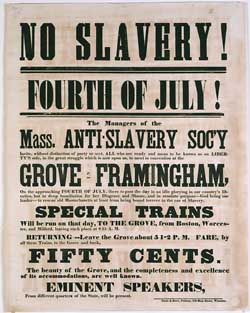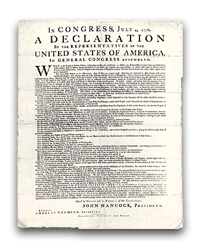Take down that flag and for the love of God turn off that Lee Greenwood. Independence Day is not about the United States. (There was no such country in 1776, before or after the Declaration; the Declaration only claimed to absolve the former colonies from any allegiance to the Crown.) Least of all is this a day for the government or for its loyalists. 4 July is for rebels and radicals.
We hold these truths to be self-evident, that all men are created
equal, that they are endowed by their Creator with certain
unalienable Rights, that among these are Life, Liberty and the
pursuit of Happiness. –That to secure these rights, Governments
are instituted among Men, deriving their just powers from the
consent of the governed, –That whenever any Form of Government
becomes destructive of these ends, it is the Right of the People to
alter or to abolish it …. [W]hen a long train of abuses and
usurpations, pursuing invariably the same Object evinces a design
to reduce them under absolute Despotism, it is their right, it is
their duty, to throw off such Government, and to provide new Guards
for their future security.
— Declaration of Independence, 4 July 1776
Jefferson, of course, claimed that the natural consequence of altering or abolishing government was to “institute new Government.” So much the worse for Jefferson (and especially for those whom he later came to govern), but that affects what’s entailed by the principles enunciated in the Declaration about as much as the fact that Jefferson pretended like he didn’t have a moral duty to immediately release his slaves from bondage affects the fact that the Declaration’s defense of complete equality and inalienable natural rights nevertheless condemned slavery beyond hope of appeal. Whatever Jefferson’s failings, his argument, if sound, is an argument against any form of coercive government whatsoever. If indeed we do have the “right to alter or abolish” government–any government–in virtue of our right to withdraw our consent to their authority, and we retain that right as free human beings no matter what institutions we may have been born into or roped into, then no government can ever rightly demand our allegiance against our will; we are, all of us, free to withdraw that allegiance and (thereby) remove ourselves from any obligation to any government at any time. The only question that remains is whether that right to alter or abolish government is a right that belongs to each of us, individually, or a right that has to be exercised collectively (by some group of us acting together). But if our right to refuse government authority derives from (1) our birthright to equal station as sovereign individuals, and (2) the natural and unalienable rights that follow from that, then it’s hard to see how these individually held rights could entail anything less than an individual right, as the political equal of any puffed-up prince or president on Earth, for you, personally, right now, to sever all political connections if you want, and to tell your would-be rulers just where they can go promulgate their law.
Over at Catallarchy they’ve been singing the praises of flag-burning. I might be more enthusiastic about it if I thought the flag were really the problem; but, aside from being even uglier than most of the world’s military colors, there’s not too much harm that you can say the flag itself has really done. But flags aren’t all that you can burn. Here’s how William Lloyd Garrison, for example, marked the occasion 151 years ago today, when Boston was outraged by the use of armed federal troops to force Anthony Burns back into Southern slavery:

The rally began with a prayer and a hymn. Then Garrison launched
into one of the most controversial performances of his career.
To-day, we are called to celebrate the seventy-eighth
anniversary of American Independence. In what spirit?
he asked,
with what purpose? to what end?
The Declaration of
Independence had declared “that all men are created equal … It is
not a declaration of equality of property, bodily strength or
beauty, intellectually or moral development, industrial or
inventive powers, but equality of RIGHTS–not of one race, but of
all races.
—Massachussets Historical Society, July 2005
We have proved
recreant to our own faith, false to our own standard, treacherous
to the trust committed to our hands; so that, instead of helping to
extend the blessings of freedom, we have mightily served the cause
of tyranny throughout the world.
Garrison then spoke about the
prospects for the success of the revolutionary spirit within the
nation, prospects he regarded as dismal because of the insatiable
greed, boundless rapacity, and profligate disregard of justice
prevalent at the time. He concluded his speech by asserting,
Such is our condition, such are our prospects, as a people, on
the 4th of July, 1854!
Setting aside his manuscript, he told
the assembly that he should now proceed to perform an action
which would be the testimony of his own soul to all present, of the
estimation in which he held the pro-slavery laws and deeds of the
nation
…
— from Thoreau: Lecture 43, 4 July, 1854
Producing a copy of the Fugitive Slave Law, he set fire to it,
and it burst to ashes. Using an old and well-known phrase, he
said, And let all the people say, Amen
; and a unanimous
cheer and shout of Amen
burst from the vast audience. In
like manner, Mr. Garrison burned the decision of Edward G. Loring
in the case of Anthony Burns, and the late
charge of Judge Benjamin R. Curtis to the United States Grand Jury
in reference to the treasonable
assault upon the Court
House for the rescue of the fugitive–the multitude ratifying the
fiery immolation with shouts of applause.
Then holding up the U.S. Constitution, he branded it as the source and parent of all the other atrocities,–“a covenant with death, and an agreement with hell,”–and consumed it to ashes on
the spot, exclaiming, So perish all compromises with tyranny!
And let all the people say, Amen!
A tremendous shout of
Amen!
went up to heaven in ratification of the deed,
mingled with a few hisses and wrathful exclamations from some who
were evidently in a rowdyish state of mind, but who were at once
cowed by the popular feeling.
–from The Liberator, 7 July 1854 (boldface added)
Happy Independence Day.


 I
I